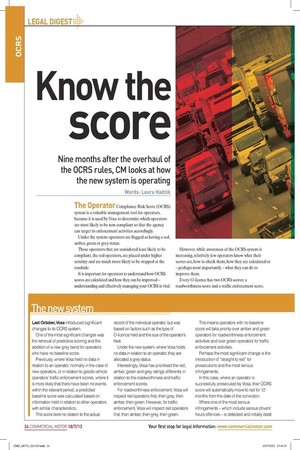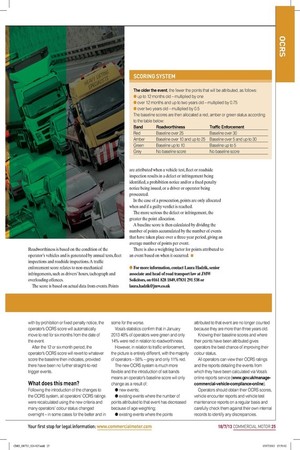Th n w tm Last October, Vosa introduced significant changes to its OCRS system.
Page 18

Page 19

If you've noticed an error in this article please click here to report it so we can fix it.
One of the most significant changes was the removal of predictive scoring and the addition of a new grey band for operators who have no baseline score.
Previously, where Vosa held no data in relation to an operator, normally in the case of new operators, or in relation to goods vehicle operators' traffic enforcement scores, where it is more likely that there have been no events within the relevant period, a predicted baseline score was calculated based on information held in relation to other operators with similar characteristics.
This score bore no relation to the actual record of the individual operator, but was based on factors such as the type of 0-licence held and the size of the operator's fleet.
Under the new system, where Vosa holds no data in relation to an operator, they are allocated a grey status.
Interestingly, Vosa has prioritised the red, amber, green and grey ratings differently in relation to the roadworthiness and traffic enforcement scores.
For roadworthiness enforcement, Vosa will inspect red operators first, then grey, then amber, then green. However, for traffic enforcement, Vosa will inspect red operators first, then amber, then grey, then green. This means operators with no baseline score will take priority over amber and green operators for roadworthiness enforcement activities and over green operators for traffic enforcement activities.
Perhaps the most significant change is the introduction of "straight to red" for prosecutions and the most serious infringements.
In this case, where an operator is successfully prosecuted by Vosa, their OCRS score will automatically move to red for 12 months from the date of the conviction.
Where one of the most serious infringements — which include serious drivers' hours offences — is detected and initially dealt with by prohibition or fixed penalty notice, the operator's OCRS score will automatically move to red for six months from the date of the event.
After the 12 or six month period, the operator's OCRS score will revert to whatever score the baseline then indicates, provided there have been no further straight-to-red trigger events.
What does this mean?
Following the introduction of the changes to the OCRS system, all operators' OCRS ratings were recalculated using the new criteria and many operators' colour status changed overnight— in some cases for the better and in some for the worse.
Vosa's statistics confirm that in January 2013 48% of operators were green and only 14% were red in relation to roadworthiness.
However, in relation to traffic enforcement, the picture is entirely different, with the majority of operators — 58% — grey and only 11% red.
The new OCRS system is much more flexible and the introduction of set bands means an operator's baseline score will only change as a result of: • new events; • existing events where the number of points attributed to that event has decreased because of age weighting; • existing events where the points attributed to that event are no longer counted because they are more than three years old.
Knowing their baseline scores and where their points have been attributed gives operators the best chance of improving their colour status.
All operators can view their OCRS ratings and the reports detailing the events from which they have been calculated via Vosa's online reports service (www.gov.uk/managecommercial-vehicle-compliance-online).
Operators should obtain their OCRS scores, vehicle encounter reports and vehicle test maintenance reports on a regular basis and carefully check them against their own internal records to identify any discrepancies.








































